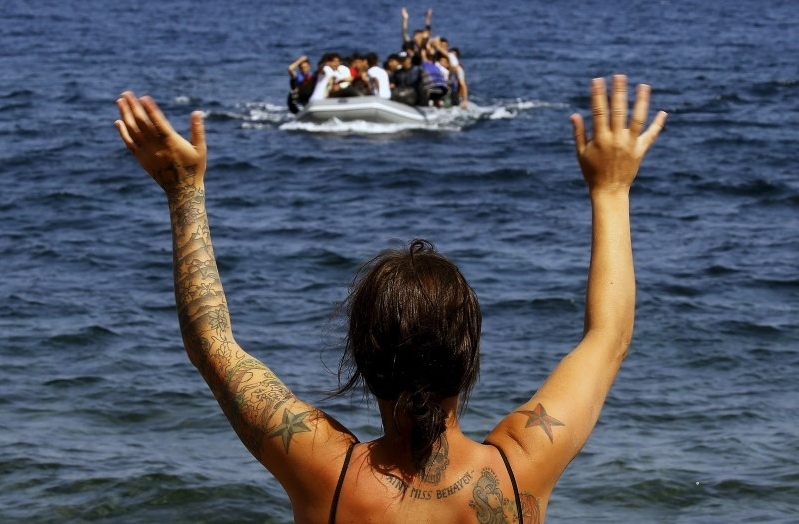
LESBOS, Greece (Reuters) - More than 2,500 mainly Syrian and Afghan refugees, soaked and exhausted, reached the Greek island of Lesbos within hours on Wednesday, a sharp rise in the rate of arrivals via the dangerous sea crossing from Turkey.
They were the latest wave of at least 430,000 refugees and migrants, a record number, to have taken rickety boats across the Mediterranean to Europe this year, 309,000 via Greece, according to International Organization for Migration figures.
Around 50 rubber dinghies each carrying up to 60 to 70 people arrived in pouring rain in the space of five hours on one Lesbos beach, which was covered in life jackets and rubber tubes. Some refugees were suffering from hypothermia.
As they approached shore, a Syrian man lifted his wailing daughter, in an orange life jacket, above their overloaded dinghy. In another, packed with Afghan families, headscarved women smiled and young, beaming men flashed the victory sign.
Emotions ranged from relief to exhaustion.
"It was difficult, we were afraid," said 18-year-old Ruhin from Afghanistan, whose sister collapsed on the shore.
The number of boats was far greater than normal for such as short period of time; 40 boat arrivals would be considered average for a full day over the past few weeks, a Reuters photographer on the scene said.
Why the numbers rose so quickly on Wednesday was unclear, but the Mediterranean will be hit increasingly by storms as autumn progresses towards winter, making the crossing too dangerous for most refugees to attempt it.
In Athens, hundreds of protesters shouting anti-EU slogans marched to European Commission headquarters in a show of solidarity with the refugees and migrants arriving on overwhelmed Greek islands. Among other things, they demanded better reception facilities and registration procedures.
"The situation on the islands has reached its limits. The government has a big responsibility," Communist-affiliated trade union PAME, which organized the protest, said in a statement.
In the summer, tensions flared on Lesbos and the nearby island of Kos, with people sleeping rough on the streets with little food and water and hygiene rapidly deteriorating, prompting aid agencies to declare a "humanitarian disaster".
Hundreds of thousands of refugees, primarily Syrians, Afghans, Iraqis and Africans fleeing war, repression and poverty, have crossed the narrow but precarious sea channel between Turkey and Greece's eastern Aegean islands this year, mainly in flimsy and overcrowded inflatable boats.
Almost all refugees and migrants quickly move on out of Greece and up through the Balkans towards wealthier countries in the EU's north and west, especially Germany and Sweden.
Over the weekend, 13 migrants, including six children, died in Turkish waters near Lesbos when a boat carrying 46 people en route to Greece collided with a dry cargo vessel and capsized.
The European Union approved a plan on Tuesday to share out 120,000 refugees, mainly from war-torn Syria, across its 28 states based on mandatory quotas, overriding vehement opposition from four ex-communist eastern nations.






